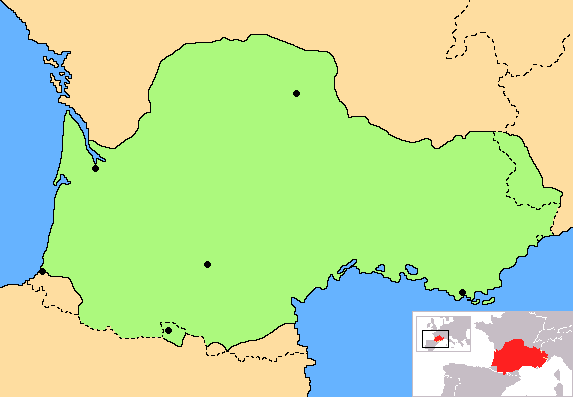
Get to Know the Occitan language and Occitan culture
By the tenth century, France was home to an array of different tongues (Gallo-Romances), each a mixture of Latin, Frankish, and other Germanic languages, in part reflecting the political variation of France, which had become a kaleidoscope of baronies, counties, duchies, and marches ruled by different nobles. By the fourteenth century, these languages had developed into two loose categories, corresponding to two different pronunciations of the word ‘yes’.
Why learn the Occitan language?
In the north, people tended to say oïl, whilst those south of the Loire generally pronounced it as oc. As such, the languages in the north were known as langues d’oïl (a term used interchangeably with Françoys), whilst those in the south were called langues d’oc.
Both oïl and oc are derived from hoc, the Latin for ‘this’ or ’that’, which was used to say ‘yes’ at the time. People in the south tended to ignore the h, leaving oc, whilst those in the north reduced it to a mere o, attaching clarifiers such as o-je (‘yes for me’), o-nos (‘yes for us’), and o-vos (‘yes for you’). Speakers began to simplify this to o-il (‘yes for that’), eventually leading to the form seen today - oui.
Some of the most ‘important’ langues d’oïl were the dialects of Picardy, Normandy, Champagne, and Orléans, whilst others, such as those of Anjou, Poitiers, and Burgundy, were spoken far south of Paris. Another notable langue d’oïl was Walloon, a dialect spoken in what is now Belgium. No one is certain who first came up with these categorisations, but a reasonable guess is Dante Alighieri, who used the term langue d’oc in his De vulgari eloquentia of 1304, contrasting it with langue d’oïl and the Romance languages of Italy (Italo-Romances), dubbed langue de si. Though the categorisation seems to begin in the fourteenth century, the existence of two vague groups of languages may have dated back several centuries prior.
Although French emerged from the langues d’oïl, it was actually the langues d’oc that enjoyed more prestige during this period. Between the eleventh and twelfth centuries, itinerant musicians, known as troubadours, went from city to city across southern France, northern Italy, and parts of northern Spain, extolling the virtues of courtly love through sung poetry. Such was the literary prestige enjoyed by this new form of poetry, two southern rulers, the Count of Toulouse and the Duke of Aquitaine, found their influence expanded. In fact, many courts in Italy adopted langue d’oc during this period. The poetry of the southern troubadours was seen as superior to the epic poems of the north - the chansons de geste - which were perceived to be cruder.
By the time Dante made reference to the langue d’oc in 1304, it had suffered persecution at the hands of the French.
Today, the various dialects that make up the langue d’oc are collectively referred to as the Occitan language, and it is still spoken in southern France. There’s also communities in Monaco, Italy, and Catalonia, with the total number of speakers of the Occitan language thought to be around 790,000. There are also efforts to revitalise the Occitan language underway today.
Despite measures in 1853 and 1880 officially prohibiting the use of dialects, which were still being pejoratively referred to as patois, local languages survived relatively unblemished until the twentieth century. Urbanisation had forced many to adopt French as a common tongue, but most remained bilingual, and the National Institue of Statistics found that a third of French citizens born before 1920 continued to speak their local language to their children. However, many of these languages did enter a stage of decline, as the importance of French grew with the pressures of modernisation, military service, and the expansion of mass media. The lexicons of local languages were rarely able to keep pace with the array of new terms required to describe the changing realities of the age, and French invariably filled the void, thus relegating the importance of the dialects over time.
The French education system expanded greatly during the nineteenth century. By 1880, the number of primary schools had risen from 1,700 to 75,000, with 6.5 million boys and girls attending. As such, most French children knew at least some French by the 1880s. With the founding of the Ministry of National Education in 1880-81, Jules Ferry built upon this, making public school compulsory and free. The stages of schooling were organised into primary, secondary, and lycée. By the Second World War, almost every French citizen understood the language, although around half still spoke a regional language as their mother tongue.
Fortunately, various writers and thinkers fought to save local languages. One of the most successful was Frédéric Mistral, a poet who sought to rekindle the Occitan language. In 1904, he became the first writer to win a Nobel Prize for literature written in a minority language. Although regional languages still face a battle to survive, efforts are being made for their preservation. Exactly how many there are depends on someone’s definition of languages and dialects, but it doesn’t really matter. Some could be considered languages, whilst others are more akin to a dialect.
The important thing is that these tongues are varied, and cultural variation is something to be treasured.
For those interested in learning more, I’d suggest doing an internet or YouTube search for Occitan, Alsatian, Corsican, Breton, Basque, Catalan, and even the more obscure, such as Bourguignon-Morvandiau or Poitevin-Saintongeais.
As a starting point for the Occitan language, it’s worth taking a look at the Institut d’Estudis Occitans, Librariá Occitana, and La Biaça.
Speakers :
790,000
Where :
France, Monaco, Italy, Spain (Catalonia)
Dialects :
Auvergnat, Gascon, Languedocien, Limousin, Provençal, Vivaro-Alpine, Niçard, Judeo-Occitan
Cover Image
Carcassonne, France
Photo by Héctor J. Rivas on Unsplash
Map
By Norrin strange - Own work, CC BY-SA 3.0, https://commons.wikimedia.org/w/index.php?curid=2408282
Resources for learning the Occitan language
-

-

YouTube Channels
-

Videos
Occitan for Beginners (Lesson 01) : Parlem Occitan - Las Vocals
Occitan Conversation for Beginners : 10 Minutes With All the Basics
D’ÒC Show Albi : Ensenhament de l’occitan
Rubriques archives occitanes : la télévision en occitan
Sònia Speaking Aranese Occitan
Josèp Speaking Aranese Occitan
Gabrièu Speaking Niçard Occitan
Weather Forecast in Occitan Language
Les expressions d’ici : l’Occitan
-

Films
-

Books
by ASSIMIL
L’Occitan (Book only) - may still be available second-hand on your preferred sites
by ASSIMIL
by ASSIMIL
Grains of Gold : An Anthology of Occitan Literature
edited by James Thomas
The World of the Troubadours : Medieval Occitan Society, c.1100-c.1300
by Linda M. Paterson
by William D. Paden
Proverbs in Medieval Occitan Literature
by Wendy Pfeffer
Multilingualism and Mother Tongue in Medieval French, Occitan, and Catalan Narratives
by Catherine E. Leglu
Singing the Crusades : French and Occitan Lyric Responses to the Crusading Movements, 1137-1336
by Linda Paterson
Morphologie élémentaire de l’ancien occitan
by Povl Skårup
La Littérature Occitane du Moyen Age
by Robert A. Taylor
-

Podcasts
-

Articles
-

-

-
All of the resources mentioned on the website and in the How to Learn Languages guides are resources I believe in. They're resources I've either found useful learning languages, or have researched for the How to Learn Languages website and guides. The overwhelming majority of these resources are not affiliate links.
I only agree to affiliate links for resources I genuinely believe in. By having affiliate links for resources I believe in, I hope this can reduce the cost of paid resources for you, whilst also helping me to continue working on books, videos, documentaries, and How to Learn Languages.
This link to the Ling app is an affiliate link. I recommend Ling because they provide a fun and convenient way to start learning languages that are less frequently covered online. If you sign up to one of Ling’s paid plans using this link, I’ll earn a commission - at no extra cost to you.
If you buy certain books linked in How to Learn Languages guides, on my websites, or social media channels, I’ll earn a commission - at no extra cost to you - from Bookshop.org, whose fees support independent bookshops. Any books that aren’t available from Bookshop.org have been linked to their relevant page on Goodreads.
This italki link is also an affiliate link. If you pay for your first lesson on italki using this link, you’ll receive $10 italki credits, and I’ll earn a commission - at no extra cost to you.
Although the series aims to show anyone how to learn languages for free, it’s true that paid resources often help save time - both in terms of preparation and organisation. By having affiliate links for resources I believe in, I hope this can reduce the cost of paid resources for you, whilst also helping to make the development of more How to Learn Languages guides possible.
Regardless of whether you use the affiliate links, thank you so much for your support. I really appreciate it.

How to Learn French eBook
If you’re interested in learning more about the history of French and Occitan, How to Learn French contains a detailed section called ‘A Short History of French’.
If you’re interested in learning Occitan, you might find it easier to start with French or Catalan. Most of the resources for learning Occitan are in French, and Catalan is the closest relative of Occitan.
Whichever route you opt for, How to Learn French and How to Learn Catalan can guide you through the process in a way that’s fast, affordable, fun, and convenient.

How to Learn Catalan eBook
Learning a language can fill us with the impetus to experience different cultures and meet new people. This could be as conveniently as watching Catalan films or reading a Montserrat Roig novel in the evening. It could be an experience as spontaneous as chatting with people at a bar in Girona, or before a football match in Barcelona. It could even be a whole new life in Andorra or Céret.
How to Learn Catalan can guide you through the process in a way that’s fast, affordable, fun, and convenient.
Download the Ling app and start learning languages less frequently covered online!
★★★★★
*Affiliate link : If you sign up for Ling Pro, I’ll earn a commission, at no extra cost to you. Ling is a resource I believe in!
Contact
Do you make videos or resources for learning a specific language? Feel free to get in touch so I can add links to your work on the relevant Get to Know page for that language, or in the relevant How to Learn Languages guide.
As well as helping people to learn languages, encouraging linguistic diversity, and raising awareness for the rights of indigenous peoples, I hope How to Learn Languages will also help to grow the audiences of anyone creating resources for learning languages.










